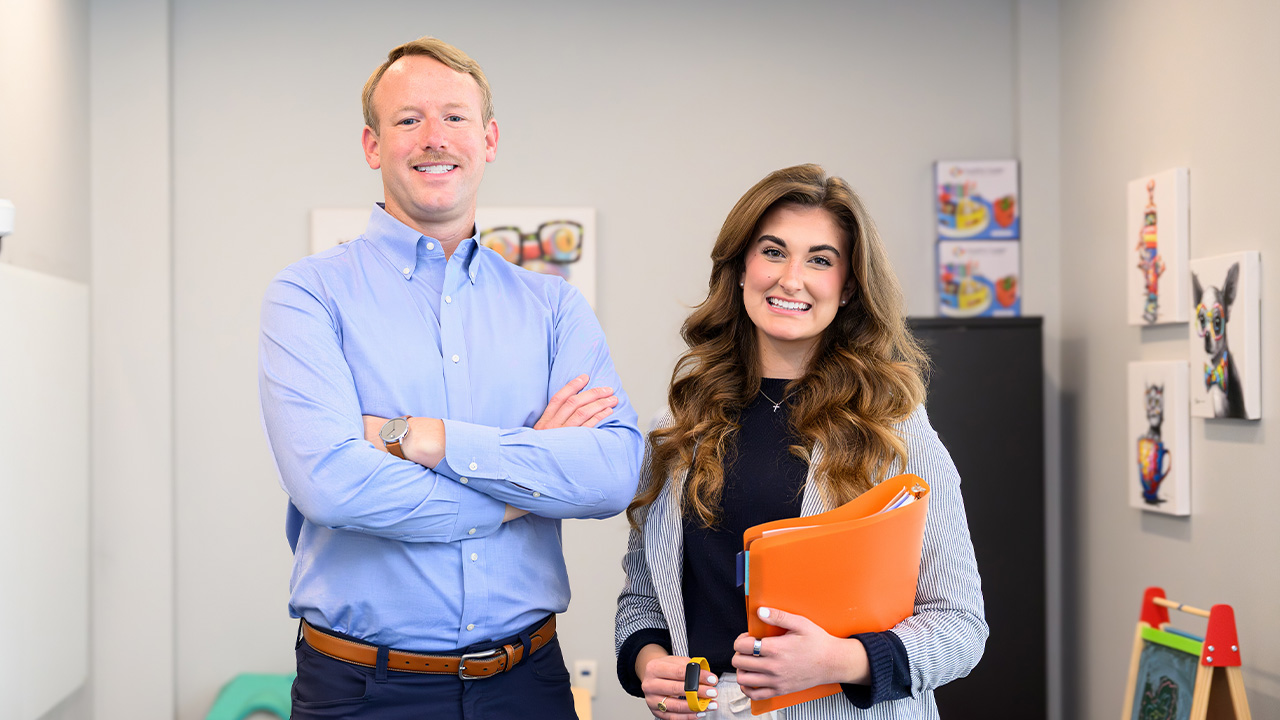content body
Elle Neuhoff knew what she wanted to study, but she couldn’t figure out how to describe it to others — that is, until she met Auburn faculty member Brian Gillis.
“I kept trying to put words to what I wanted. The feeling of relief that came from meeting him was the most validating and encouraging feeling,” she said. “I realized then that it exists — someone does what I want to do!’”
And what she wants to do is combine her love of neuroscience research with practicing as a sleep therapist.
A native of Newport Beach, California, Neuhoff studies sleep as a graduate student in the College of Human Sciences' Marriage and Family Therapy program, housed in the Department of Human Development and Family Science (HDFS). She had known for years she wanted to combine science and therapy, but it wasn’t until she met Gillis, an assistant professor in the department, that she realized she could.

In the past, Neuhoff’s research focused solely on adults, but now, she’s using her time on the Plains to become a pediatric sleep practitioner.
“While I still love the data and research side, I really value human interaction and developing relationships with clients to actually apply that research,” she said. “It was phenomenal when I realized this program paired those interests in a way I didn’t even know was possible.”
A family affair
One reason Neuhoff didn’t know about Auburn’s sleep research was that she’d never set foot on campus until her younger sister enrolled and decided to declare a major in HDFS, the very same department where Neuhoff would end up.
“We’re super close,” she said. “To not only be in this place together but to also have a shared academic interest is really neat.”
Neuhoff, who holds a bachelor's degree in neuroscience research from Baylor University, was visiting her sister when she stopped by the HDFS department office on a whim.
Despite the fact it was a late Friday afternoon before a home football game, the director of the Marriage and Family Therapy program, Scott Ketring, dropped everything to meet with her. Then, he took her to the department’s research space at the Auburn Research Park, where he introduced her to sleep research expert Gillis.
“He was so kind and welcoming; he made me a coffee, we sat down in his office and it felt like divine design,” she said. “The match in our common interests was just the greatest gift that day.”
Clinicians who care
Now, Neuhoff is Gillis’ graduate research assistant, honing her scientific sleep research while taking classes to prepare for clinical work with families.
“While I still love the data and research side, I really value human interaction and developing relationships with clients to actually apply that research. It was phenomenal when I realized this program paired those interests in a way I didn’t even know was possible.”
The Marriage and Family Therapy program accepts six graduate students each year through a competitive application process, and each one develops a different area of expertise. They take similar classwork to obtain therapeutic licensure and get practice hours in the program’s clinic while also branching off into more focused research and assistantships. While Neuhoff studies sleep, other students are researching how couples manage physical illnesses and identifying processes that support healthy relationship functioning.
In the past, Neuhoff’s research focused solely on adults, but now, she’s using her time on the Plains to become a pediatric sleep practitioner. And while she plans to continue her scientific data collection using sleep studies and functional magnetic resonance imaging (fMRI) — “We have the best one you can get, literally right across the street,” she said — Neuhoff is impressed with the program’s dedication to creating therapists who care.
“It’s easy in the world of academics to emphasize grades and academic outcomes, but what stood out to me is the heavy emphasis on collaborative, discussion-based classes,” she said. “There’s a greater goal in mind beyond turning in assignments and checking a box; the concern is placed on creating excellent clinicians who are ethically sound.”
These days, Neuhoff is cheering at football games, spending time with her sister and delving into coursework and research. And now, she’s able to explain to others exactly what she studies: how to apply neuroscience sleep research to care for families in a therapy setting.
“I always thought I would have to be focused exclusively on data, numbers and research or exclusively working with clients,” she said. “To find that intersection in this program was something I didn’t think was possible.”





